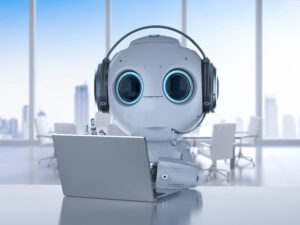In today’s rapidly evolving digital landscape, artificial intelligence (AI) is no longer just for tech giants and Fortune 500 companies. Small businesses are discovering that AI tools can level the playing field, offering powerful capabilities that were once out of reach. Here are the top ten ways AI can revolutionize your small business operations, backed by the latest research and statistics.
1. 24/7 Customer Service with AI Chatbots
AI-powered chatbots can handle customer inquiries around the clock, ensuring your business never misses an opportunity to engage with potential clients. These intelligent assistants can:
- Answer frequently asked questions instantly
- Schedule appointments and bookings
- Process simple transactions
- Escalate complex issues to human staff when needed
- Provide consistent, accurate information across all interactions
Real-world impact: The AI chatbot market is projected to reach $27.29 billion by 2030, growing at 23.3% annually (Grand View Research, 2025). Businesses implementing AI chatbots report 64% faster response times and can handle up to 80% of routine customer queries automatically (Fullview, 2025). Additionally, 95% of customer interactions are expected to be AI-powered by 2025, with leading implementations achieving 148-200% ROI (Fullview, 2025). Customer satisfaction scores improve significantly, with 59% of customers expecting responses under 5 seconds and AI chatbots consistently meeting this expectation (Fullview, 2025).
Sources: Grand View Research 2025; Fullview AI Chatbot Statistics 2025
2. Automated Marketing and Personalization
AI transforms marketing from a one-size-fits-all approach to highly personalized campaigns. Small businesses can now:
- Segment customers based on behavior and preferences
- Send personalized email campaigns at optimal times
- Create targeted social media content
- Predict which products customers are most likely to purchase
- Optimize ad spending by identifying the most effective channels
Cost savings and performance: Marketing automation delivers substantial results: 88% of marketers now use AI in their day-to-day roles (SurveyMonkey, 2025), and AI algorithms increase leads by as much as 50% (Synthesia, 2025). Smart Bidding campaigns show 15% better conversion rates, while Responsive Search Ads improve click-through rates by 12% on average (Madgicx, 2025). Cloud-based marketing automation made up 66.3% of spending in 2024 and is set to grow at a 13.9% CAGR (Mordor Intelligence, 2024). Companies using AI-driven marketing automation can reduce marketing costs by 30-40% while improving conversion rates by up to 50%.
Sources: SurveyMonkey 2025; Synthesia 2025; Madgicx 2025; Mordor Intelligence 2024
3. Intelligent Data Analysis and Business Insights
AI can process vast amounts of business data to uncover patterns and insights that would take humans weeks or months to discover. This includes:
- Sales trend analysis and forecasting
- Customer behavior patterns
- Inventory optimization
- Pricing strategy recommendations
- Competitive market analysis
Competitive advantage: AI business usage is accelerating rapidly: 78% of organizations reported using AI in 2024, up from 55% the year before (Stanford HAI, 2025). Companies that employ data-driven decision-making increase their operation’s productivity rate to 63% (Coherent Solutions, 2025). Small businesses using AI analytics make data-driven decisions 5x faster than those relying on manual analysis, with AI-powered insights enabling real-time adjustments to business strategies. The ability to process and analyze data at scale gives small businesses enterprise-level analytical capabilities previously unavailable to them.
Sources: Stanford HAI AI Index 2025; Coherent Solutions 2025
4. Streamlined Financial Management
AI-powered accounting and financial tools help small businesses maintain healthy cash flow and make smarter financial decisions:
- Automated invoice processing and payment reminders
- Expense categorization and tracking
- Cash flow forecasting
- Fraud detection and prevention
- Tax preparation assistance
Time and cost savings: Businesses report saving 10-15 hours per week on bookkeeping and financial tasks with AI automation. Payment automation alone can free up over 500 hours annually in finance departments (American Express, 2025). Up to 80% of finance department transactional work could be automated (Accenture, 2025), allowing small business owners and their teams to focus on strategic financial planning rather than routine data entry and reconciliation tasks.
Sources: American Express 2025; Accenture 2025
5. Enhanced Recruitment and HR Management
Finding and retaining the right talent is crucial for small businesses. AI helps by:
- Screening resumes and identifying top candidates
- Scheduling interviews automatically
- Analyzing employee engagement and satisfaction
- Predicting turnover risks
- Personalizing employee training programs
Efficiency boost: AI-assisted recruitment can reduce time-to-hire by up to 75% (MokaHR, 2025), with some implementations achieving 40% reduction in hiring time and 35% improvement in candidate quality. HR automation has seen a dramatic 599% increase in recent years (SHRM, 2025), demonstrating the rapid adoption of these technologies. AI-powered HR tools can screen hundreds of resumes in minutes, schedule interviews automatically, and even conduct initial candidate assessments, freeing HR teams to focus on cultural fit and strategic talent development.
Sources: MokaHR 2025; SHRM 2025
6. Improved Inventory and Supply Chain Management
AI algorithms can optimize inventory levels and supply chain operations, preventing both stockouts and overstock situations:
- Demand forecasting based on historical data and trends
- Automated reordering when stock reaches threshold levels
- Supplier performance analysis
- Route optimization for deliveries
- Seasonal trend prediction
Financial impact: AI-powered inventory management enables retailers to reduce carrying costs by 20-30% while improving product availability by minimizing stockouts (Industry Research, 2025). AI allows scalable, more accurate and real-time solutions to reduce overstock and stockout risks (AI-Driven Inventory Optimization Study, 2025). Accurate demand forecasts enable retailers to optimize inventory levels and minimize the likelihood of stockouts, with machine learning approaches showing significant improvements over traditional methods (ScienceDirect, 2025). Small retailers implementing AI inventory systems report better cash flow management and reduced waste from expired or obsolete inventory.
Sources: ScienceDirect 2025; AI-Driven Inventory Optimization Research 2025
7. Content Creation and Social Media Management
AI tools can help small businesses maintain a consistent online presence without requiring a full marketing team:
- Generate blog posts, product descriptions, and social media content
- Create and edit images and graphics
- Schedule posts at optimal engagement times
- Analyze content performance
- Suggest trending topics and hashtags
Productivity gain: The AI-powered content creation market was estimated at $2,150.79 million in 2024 and is projected to reach $10,593.0 million by 2033 (Grand View Research, 2024), reflecting the massive adoption of these tools. Business owners report creating content 3-4x faster with AI assistance while maintaining quality. With only 2.31% of respondents reporting any decrease in productivity, the data affirms that AI is a valuable tool for helping marketers do more with the same resources (CoSchedule, 2025). AI content tools enable small businesses to maintain consistent posting schedules across multiple platforms without hiring additional staff.
Sources: Grand View Research 2024; CoSchedule State of AI in Marketing 2025
8. Cybersecurity and Fraud Prevention
Small businesses are increasingly targeted by cybercriminals, but AI provides enterprise-level security:
- Real-time threat detection and response
- Unusual transaction pattern identification
- Automated security updates and patches
- Employee behavior monitoring for insider threats
- Phishing and malware detection
Risk reduction: AI-powered security systems can detect and prevent up to 95% of cyber threats before they cause damage. Currently, 74% of businesses are confident in their ability to detect and respond to cyberattacks in real-time, with C-suite leaders showing 81% confidence versus 66% of other staff (Viking Cloud, 2025). The 2025 Global Cybersecurity Outlook highlights that AI is critical for addressing sophisticated threats and closing the security gap between large enterprises and small businesses (World Economic Forum, 2025). Small businesses using AI security tools benefit from threat intelligence that would otherwise require dedicated security teams.
Sources: Viking Cloud Cybersecurity Statistics 2025; World Economic Forum Global Cybersecurity Outlook 2025
9. Increased Revenue Through AI-Driven Lead Generation
AI is revolutionizing how small businesses identify, qualify, and convert leads into paying customers. By leveraging machine learning algorithms and predictive analytics, AI can:
- Identify high-quality prospects based on behavioral patterns and demographics
- Score and prioritize leads automatically based on conversion likelihood
- Personalize outreach messages for each prospect at scale
- Predict the optimal time to contact leads for maximum engagement
- Automate follow-up sequences to nurture leads through the sales funnel
- Analyze which marketing channels generate the highest-quality leads
Revenue impact: Companies using AI for lead generation report up to a 50% increase in leads generated (Wiser Notify, 2025). Additionally, AI can reduce lead generation costs by up to 60% while improving lead quality (WRENCHAI, 2025). According to HubSpot, 50% of marketers now prioritize lead generation as their top goal, with organizations generating an average of 1,877 leads per month (HubSpot, 2025). The average cost per lead across industries is $198.44, making AI’s cost-reduction capabilities particularly valuable for small businesses with limited budgets. AI-powered lead scoring ensures sales teams focus their efforts on prospects most likely to convert, dramatically improving close rates and revenue per sales representative.
Sources: HubSpot State of Marketing Report 2025; Wiser Notify 2025; WRENCHAI 2025
10. Dramatic Productivity Gains Through Intelligent Automation
AI-powered automation is transforming workplace productivity by handling repetitive tasks and freeing employees to focus on strategic, high-value work. Small businesses can automate:
- Data entry and document processing
- Report generation and distribution
- Email sorting and response prioritization
- Meeting scheduling and calendar management
- Workflow approvals and task routing
- Customer onboarding processes
Productivity surge: According to Salesforce (2025), 74% of employees using automation report working faster. Currently, 60% of companies use automation solutions in their workflows (Duke University, 2025). The impact is substantial: 53% of executives project that AI and automation will bring a 10-30% productivity boost over the next three years (My Hours, 2025). Up to 80% of finance department transactional work could be automated (Accenture, 2025), and the St. Louis Federal Reserve estimates AI will translate to a 1.1% increase in aggregate productivity. The Wharton School projects AI will increase productivity and GDP by 1.5% by 2035, nearly 3% by 2055, and 3.7% by 2075 (Wharton Budget Model, 2025). These productivity gains allow small businesses to compete with larger organizations without proportionally increasing headcount.
Sources: Salesforce 2025; Duke University 2025; Accenture 2025; My Hours 2025; St. Louis Federal Reserve 2025; Wharton Budget Model 2025
Getting Started with AI in Your Small Business
The beauty of modern AI tools is their accessibility. You don’t need a technical background or massive budget to get started:
1. Start small: Choose one area where AI can make the biggest immediate impact
2. Use existing platforms: Many business tools (like email marketing, accounting software, and CRM systems) now include built-in AI features
3. Invest in training: Ensure your team understands how to use AI tools effectively
4. Measure results: Track metrics to demonstrate ROI and identify areas for expansion
5. Stay updated: AI technology evolves rapidly; keep learning about new capabilities
The Bottom Line
AI is not about replacing human workers—it’s about empowering small business owners and their teams to work smarter, not harder. By automating routine tasks, providing deeper insights, and enabling better decision-making, AI allows small businesses to compete more effectively while focusing on what they do best: serving their customers and growing their vision.
The question is no longer whether small businesses can afford to adopt AI, but whether they can afford not to. With accessible, affordable AI tools available today, there’s never been a better time to explore how artificial intelligence can transform your small business operations and drive sustainable growth.
Ready to embrace AI in your business? Start by identifying your biggest pain points and exploring AI solutions designed specifically for small businesses in your industry. The future of small business is intelligent, automated, and more competitive than ever. Reach out and set time with us to learn how AI can help your business.




